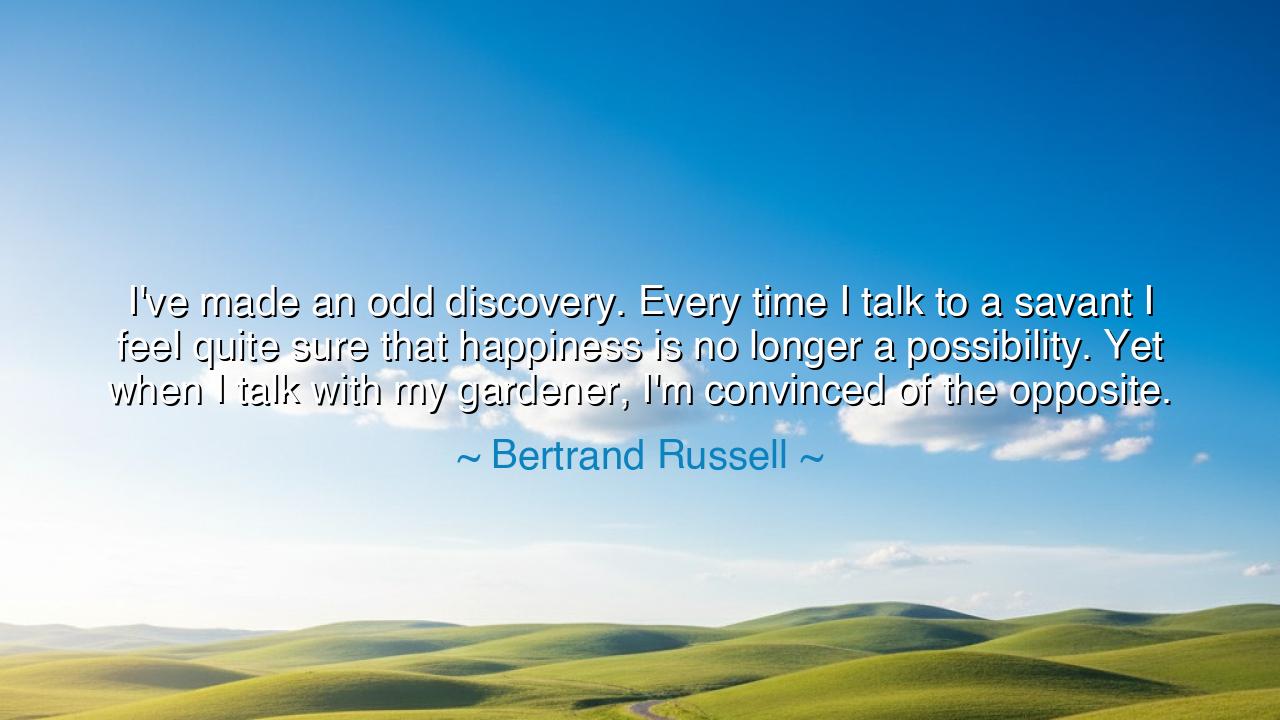
I've made an odd discovery. Every time I talk to a savant I feel
I've made an odd discovery. Every time I talk to a savant I feel quite sure that happiness is no longer a possibility. Yet when I talk with my gardener, I'm convinced of the opposite.






The philosopher Bertrand Russell, a seeker of truth and a critic of illusion, once confessed with gentle irony: “I’ve made an odd discovery. Every time I talk to a savant I feel quite sure that happiness is no longer a possibility. Yet when I talk with my gardener, I’m convinced of the opposite.” In these words lies a paradox that is as ancient as human thought — that knowledge, though luminous, can sometimes blind, while simplicity, though humble, can open the heart to peace. Russell, who had walked among the greatest minds of his age, saw clearly that the intellect, when left unbalanced by wonder, can become a burden heavier than ignorance itself.
The origin of this thought emerges from Russell’s lifelong struggle between reason and joy. He was a man devoted to logic, mathematics, and the pursuit of truth — yet haunted by the emptiness that often accompanies intellectual mastery. In the salons of philosophers and scientists, he found brilliance but rarely contentment. He saw that those who dissected the world with their minds often forgot how to live within it. In contrast, when he spoke to his gardener — a man of the soil, whose days were spent in the rhythm of nature, sowing and tending life — he saw in him a serenity untouched by the restless questioning of the scholar. Thus Russell discovered that happiness is not born from knowing everything, but from being at peace with the little one knows.
There is deep wisdom in this contrast between the savant and the gardener. The savant lives in abstraction; his eyes are turned inward, forever analyzing, doubting, measuring. His knowledge is vast, yet his joy often withers beneath the weight of his thoughts. He studies the mechanics of the stars, yet forgets to marvel at their light. The gardener, however, works in silence. His hands meet the earth, his spirit keeps rhythm with the seasons, and his heart rejoices at the sight of a new bloom. He does not need to understand the mathematics of sunlight to feel its warmth. His wisdom is not written in books, but in the soil of experience. Thus Russell, like the sages of old, came to see that wisdom without humility leads to despair, while simplicity guided by gratitude leads to peace.
Consider the story of Leo Tolstoy, the great Russian writer who, after conquering fame and fortune, fell into a deep despair. Surrounded by intellectuals, he found no joy in philosophy or theology, no comfort in his towering intellect. It was only when he turned to the peasants — those who toiled in the fields, who sang while they worked, who lived with faith rather than reason — that he found a glimpse of meaning. Their contentment, born from harmony with life rather than mastery over it, restored his spirit. Like Russell’s gardener, they lived not in the pursuit of happiness, but in the quiet acceptance of being alive.
Russell’s observation is thus a warning to all who worship intellect without compassion. The mind is a splendid tool, but a cruel master. Knowledge can illuminate, but it can also isolate. When we lose touch with the simplicity of life — with the laughter of a child, the scent of the rain, the humility of work — we lose the very essence of happiness. True joy, he reminds us, comes not from solving life, but from participating in it. The gardener’s wisdom lies not in his theories, but in his presence — in the way he meets each day as both a labor and a blessing.
This truth was known even to the ancients. The Greek philosopher Epicurus, often misunderstood as a lover of pleasure, taught that happiness comes not from luxury or brilliance, but from simplicity — from friendship, from moderation, from the absence of unnecessary desire. The Buddha, too, taught that suffering arises from craving and overthinking, and that peace is found in mindfulness, in being present. Across centuries and cultures, the same truth has echoed: that the wise man must learn again to be as simple as the gardener, for in simplicity lies freedom from the prison of thought.
Let every listener take this lesson to heart: seek not only to understand life, but to live it. Cultivate your mind, but do not forget to cultivate your heart. Be curious, but also be still. Let the world’s mysteries awaken wonder, not weariness. Spend time in the garden of the present moment — plant kindness, nurture gratitude, and harvest peace. For as Bertrand Russell discovered, the measure of wisdom is not how much one knows, but how gently one lives with what one knows.
And so, let this be passed down: Happiness belongs not to those who master the world, but to those who dwell harmoniously within it. The savant may know the laws of nature, but the gardener feels its heartbeat. Strive, therefore, not to know everything, but to love something deeply — and in that love, you will find the quiet, enduring joy that the great minds of the world so often overlook.






AAdministratorAdministrator
Welcome, honored guests. Please leave a comment, we will respond soon